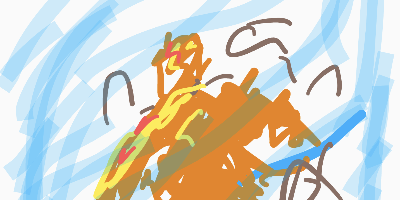jan 1, 430 BC - Hēródotos; "Historíai"
Description:
§ 5.9 Of the region lying further on towards the North of this country no one can declare accurately who the men are who dwell in it; but the parts which lie immediately beyond the Ister are known to be uninhabited and vast in extent. The only men of whom I can hear who dwell beyond the Ister are those who are said to be called Sigynnai, and who use the Median fashion of dress. Their horses, it is said, have shaggy hair all over their bodies, as much as five fingers long; and these are small and flat-nosed and too weak to carry men, but when yoked in chariots they are very high-spirited; therefore the natives of the country drive chariots. The boundaries of this people extend, it is said, to the parts near the Enetoi, who live on the Adriatic; and people say that they are colonists from the Medes. In what way however these have come to be colonists from the Medes I am not able for my part to conceive, but everything is possible in the long course of ages. However that may be, the Ligurians who dwell in the region inland above Massalia call traders sigynnai, and the men of Cyprus give the same name to spears.§ 5.10 Now the Thracians say that the other side of the Ister is occupied by bees, and that by reason of them it is not possible to pass through and proceed further: but to me it seems that when they so speak, they say that which is not probable; for these creatures are known to be intolerant of cold, and to me it seems that the regions which go up towards the pole are uninhabitable by reason of the cold climate. These then are the tales reported about this country; and however that may be, Megabazos was then making the coast-regions of it subject to the Persians.
§ 115 These are the extremities in Asia and in Libya; but as to the extremities of Europe towards the West, I am not able to speak with certainty: for neither do I accept the tale that there is a river called in Barbarian tongue Eridanos, flowing into the sea which lies towards the North Wind, whence it is said that amber comes; nor do I know of the real existence of "Tin Islands" from which tin comes to us: for first the name Eridanos itself declares that it is Hellenic and that it does not belong to a Barbarian speech, but was invented by some poet; and secondly I am not able to hear from any one who has been an eye-witness, though I took pains to discover this, that there is a sea on the other side of Europe. However that may be, tin and amber certainly come to us from the extremity of Europe. (Herodotus, Histories, 3.115
Added to timeline:
Date:
jan 1, 430 BC
Now
~ 2457 years ago
